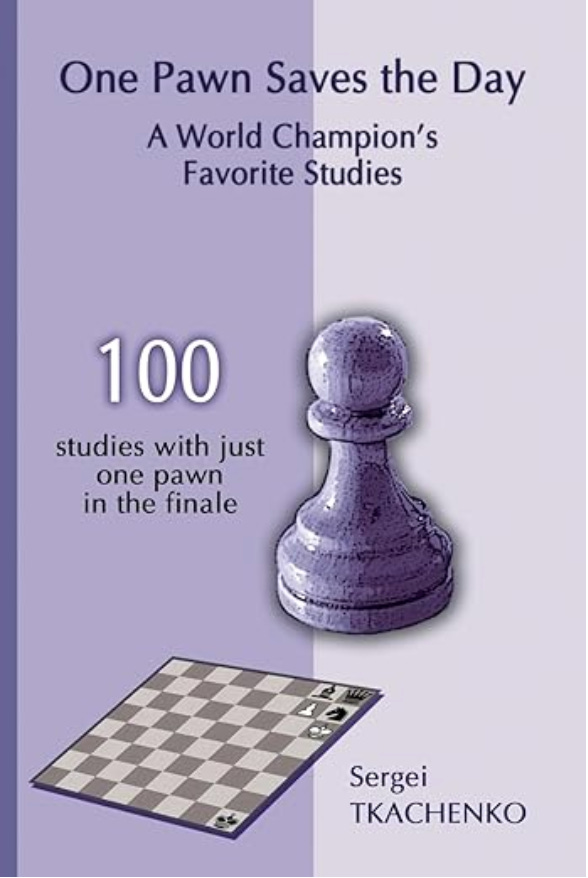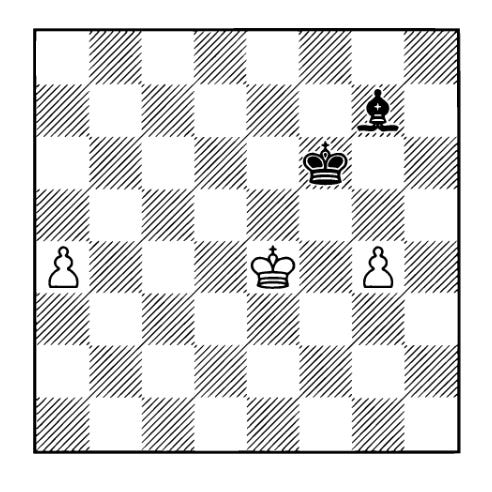I really enjoy working on endgame studies: specifically crafted positions where you are asked to find a forced win or draw. The key difference between studies and typical tactical puzzles is that studies are artificially constructed, with every piece and pawn serving a purpose. In contrast, tactical puzzles often contain irrelevant pieces that happened to be present in the real game where the position occurred. Endgame studies are beautiful and demonstrate brilliant, creative ideas. I believe they are one of the finest manifestations of art in chess.
Several famous coaches and grandmasters advocate using endgame studies for calculation practice. For example, when GM Ramesh RB (coach of GM Praggnanandhaa) gave us a talk at Chess Gym, he shared something surprising: solving studies for 3-4 hours each day can notably improve calculation skills in just five days! To quote from his book "Improve Your Chess Calculation":
Whenever I feel my student’s calculation skills are not up to the mark, I will make them solve studies for three to four hours a day for around three to five days in a row. Usually, the students show significant improvement in their calculation skills. Choosing appropriate level of studies is critical in that regard.
In studies, each unit on the board has relevance; otherwise they would not be present. By solving studies, we will learn to appreciate using every unit in the position in our analysis. No small detail is ignored.
GM Ramesh stresses the importance of selecting studies at the right difficulty level. Studies that are too challenging can discourage us and lead to giving up, while those that are too simple may cause us to become careless or bored, rushing through moves without proper analysis.
He also notes that it's perfectly acceptable to spend up to 40 minutes on a single study — there's no need to rush. It's crucial to solve without moving the pieces on the board. When the difficulty level matches your ability, maintaining self-belief and confidence will help sustain your motivation throughout the solving process.
The key question now is: how can we find studies at the right difficulty level?
But first, let me share one of my favorite studies by French composer Henri Rinck from 1903. White to play and win:
Sources of graded studies
There are several approaches to grading chess studies by difficulty. One method relies on experienced coaches like GM Ramesh, who assess study difficulty by observing multiple students' performance — tracking their solving time and success rate. These coaches can then share their curated, graded studies through books or Chessable courses.
Another approach would be to find or build a website that automatically grade studies based on user performance, similar to how ChessTempo or Lichess rate their tactical puzzles.
Let me share a couple of good sources that I've found.
“Improve your Chess Calculation” book by GM Ramesh
Chapter 6, titled "Improve your calculation through solving studies", contains 62 studies by renowned composers (Rinck, Kubbel, Troitsky, Afek) divided into four levels of increasing difficulty:
Level 1: 10 studies
Level 2: 19 studies
Level 3: 17 studies
Level 4: 16 studies
As a player rated around 1800 FIDE, I managed to solve all Level 1 studies, though some took up to 30 minutes to complete.
Here's an example Level 1 puzzle from the book: White to play and draw - Leonid Kubbel, 1928.
“Endgame Studies 101” Chessable course by IM Kostya Kavutskiy
IM Kostya Kavutskiy (one of ChessDojo's coaches) is a strong believer in the power of endgame studies. He published a Chessable course "Endgame Studies 101" dedicated to solving studies, recognizing that typical study books are often too difficult for amateurs. His course presents 100 digestible studies split across 4 levels, and teaches solving techniques through chapters on common themes: "Attraction", "Zugzwang", "Stalemate", "Domination", "Passed Pawn Tricks", "Reciprocal Thinking" and more.
Kostya assigns the following rating to his difficulty levels:
Level 1: 1200-1400
Level 2: 1400-1600
Level 3: 1600-1800
Level 4: 1800-2000
He includes 25 studies per level, plus additional problems for each individual theme and technique.
Here is an example of Level 1 study. White to play and win. Averbakh:
Level 3 study. White to play and win. Rinck, 1945:
This is an excellent course. Given sufficient time, I could solve most of the studies across all four levels, though some of the Level 3 and 4 studies proved challenging.
CT-ART 4.0 software
Some of you may remember CT-Art 4.0 from the early 2000s — an app widely recommended as an excellent tactical trainer. Based on Maxim Blokh's books, it contained thousands of tactical puzzles grouped by motifs. I recently discovered that this software not only survived but thrives on modern platforms like AppStore and GooglePlay! It comes with several interesting and unique features, and it's even recommended by IM Kostya Kavutskiy to his students. After purchasing the app, I was delighted to find it includes a special section with graded Endgame Studies, following the same rating system as its tactical puzzles.
This section is tucked away under "Chess Tactics Art for Advanced" and contains over 800 studies of varying difficulty! The studies are organized by themes like "Attacking the King," "Stalemate," and "Draws by Perpetual Check or Repetition," with difficulty ratings ranging from 100 to 200.
Example Study #1 (Difficulty: 100 points) — White to play and win.
Overall, I strongly agree with Kostya's assessment of this app: it's an excellent addition to my chess app collection. Since it works offline, you'll have access to all the puzzles even if you end up on an uninhabited island without Internet! I'll likely showcase some of its cool features in a future post.
Books by Sergei Tkachenko
Sergei Tkachenko, a chess composer and member of the Ukrainian team that won the 1997 World Chess Composition Championship, authored a series of books featuring endgame studies where specific pieces play decisive roles. His series includes titles like "One Pawn Saves the Day", "One Bishop Saves the Day", "One Knight Saves the Day", and similar books for other pieces. Each book contains 100 endgame studies with solutions that can be reached within six moves, with an implicit hint about which piece proves crucial in the finale. Despite their relatively short solutions, these studies are quite challenging — I would rate most of them as more difficult than Level 4 of the "Endgame Studies 101" course.
Due to their complexity, I often solve these studies by moving the pieces on the board when I can't work them out in my head.
Here's study #2 from the Pawn book. White to play and win. Otten, 1892:
ChessBase Studies
ChessBase offers a free online portal called ChessBase Studies. It contains over 8,000 studies that can be filtered by material and includes helpful hints. While the platform awards points to users for solving studies, it doesn't rate the difficulty of the studies themselves. Though I initially found it promising, the confusing user interface (typical of ChessBase products) and lack of difficulty ratings made me lose interest. Still, it's a valuable resource if you're not concerned about study difficulty levels.
Sources for advanced study solvers
For those who don't need difficulty ratings, several comprehensive sources offer extensive collections of studies.
Arves.org — Endgame Study Association. Though it has an old-school interface, it contains a wealth of study-related materials: various lists, magazines, study databases, and query tools. Its materials are extensive, but navigating the site requires some technical patience.
HHdbVI - Harold van der Heijden database. This comprehensive database costs 55 EUR and contains 93,839 studies — making it the largest curated collection of chess studies in the world. Though it's distributed as a simple PGN file, it's highly respected in the chess community.
YACPDB — Yet Another Chess Problem Database. This database lets you search for problems by specific composers or highly specialized study topics like "Anticipatory Interference." For example, here is a query to search for all 1561 problems by Henri Rinck: he was very productive!
Books: “Domination in 2,545 Endgame Studies” by Kasparyan (reputedly used by GMs to train, for example by GM Alex Colovic). “Practical Chess Beauty” by Yochanan Afek (one of the contemporary maestros of chess composition). “100 Endgame Studies You Must Know” — a new book by GM Jan Timman, excerpt from “New In Chess” here.
Final Thoughts
I hope this exploration of graded chess studies has been enlightening!
As 2024 draws to a close, this will be my final post of the year. Since launching this blog in January, we've grown to over 300 subscribers — including some paid supporters! I'm thrilled about this growth and look forward to continuing our journey in the new year. Special thanks to Martin Justesen, Dan Bock, Nick Vasquez, and Nicholas Sloan for recommending my Substack, and to Ben Johnson for featuring my posts in his excellent Linkfest newsletter.
2024 has been a good year for my chess development. This autumn, I reached my personal best in FIDE classical rating, as well as my highest ChessCom rapid and blitz ratings. Through several OTB tournaments, I've met incredible people and deepened my love for the game.
As we enter the holiday season, I wish you continued joy in our beloved game. Chess has this unique ability to create lifelong friendships and fierce rivalries, to lift us to euphoric heights one day and humble us the next. May you maintain your passion for chess and savour the journey, embracing all its positive moments.
If you enjoy my writing, consider subscribing to my newsletter — it's free! For those who'd like to offer additional support, a paid subscription (monthly or yearly) would make a wonderful Christmas gift and isn't too costly.
Thank you and see you in 2025!














Excellent Ivan - thanks a lot! I’d totally forgotten about Ramesh’s claim about solving studies for 3-4 hours.
Now to find 3-4 hours a day …. Hope you have a great 2025!
A fantastic write up. Great post.